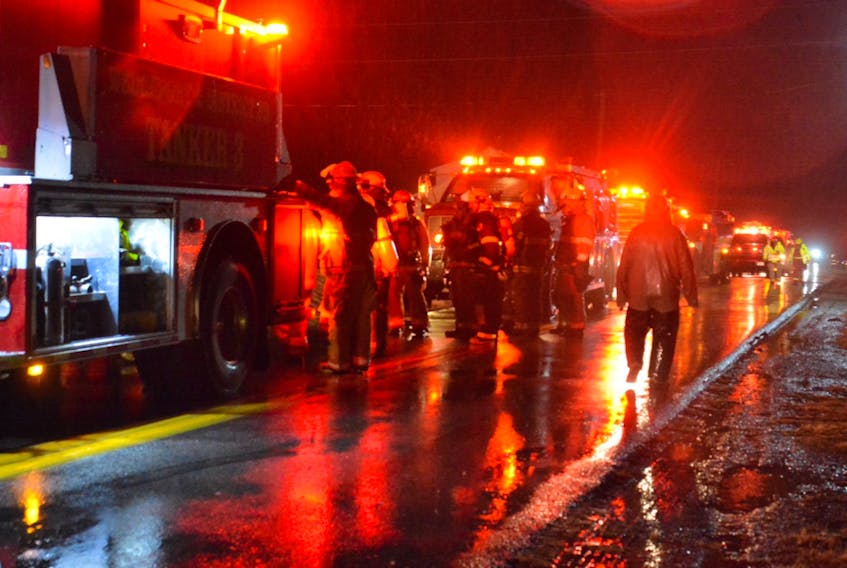YARMOUTH, N.S. – The hope amongst fire departments in the tri-county region continues to be that local dispatchers remain on the job. But at an Aug. 1 meeting there was also discussion about being prepared in case this doesn’t happen.
The Town of Yarmouth said months ago it intended to put out a request for proposals (RFP) to explore options for outsourcing the dispatching services run from the Yarmouth Fire Department. As of Aug. 2 it still had not issued the RFP.
On Aug. 1 the Municipality of Yarmouth facilitated a meeting that representatives from potentially-impacted fire departments in the region were invited to.
“When the (dispatch) issue first arose, council asked the volunteer fire departments what they needed in terms of support from the municipality,” explained Victoria Brooks, CAO of the Municipality of the District of Yarmouth. “One of the items was to provide access to accurate information relating to dispatch service delivery in other parts of N.S.”

Attending the meeting was Jim Roper, president of the Fire Service Association of Nova Scotia (FSANS). Brooks says the session was designed to provide a dialogue between the association and fire service providers from Shelburne all the way around to Clare. Part of the information shared surrounded the development of dispatch standards that came into being following consultations with various groups.
In April, the Town of Yarmouth issued layoff notices – for a time yet to be determined – to its four fire dispatchers, saying it would be looking to outsource dispatch services. The decision was not a reflection of the work done by the dispatchers, the town said. Rather it was based on what the town called a broken funding model that sees the town and its taxpayers covering a disproportionate cost of the fire dispatch services that are provided to two dozen fire departments.
There was an alternative draft proposal submitted to the town in June from a group of area CAOs on the issue. The town discussed that proposal in-camera due to ongoing contract negotiations and has not yet commented publicly on what the proposal contained.
Since the town issued layoff notices to the dispatchers, people have passionately expressed their desire to save the dispatcher jobs. There have also been concerns raised by the fire departments and the public pertaining to outsourcing. One concern that is been raised repeatedly is over response times and people from outside of the area not being as familiar with the local geography and where the closest fire departments are. Roper, who with Brooks met with local media the morning after the meeting, was asked if this should be an area of public concern.
“It really shouldn’t be,” he said, looking to ease concerns. “With the technology available today and the radio systems that are available there should be no difference in the time that call is placed to the time that fire department is paged out.”
Another concern raised surrounds the loss of local knowledge that the dispatchers working here have. What if people don't, or can’t, give civic addresses or proper road names when calling in an emergency. Is this a valid concern, Roper was asked?
“I think at one period it was. But with the technology with the mapping systems that they have today, it becomes much less of a concern. There will still be issues that arise . . . but I think it can be overcome.”
He noted a critical factor is also ensuring a strong civic numbering system is in place.
But Yarmouth dispatcher Peter Poirier says the concerns are valid ones. He says mapping and technology aren't always reliable when a fire call comes in.
"I had a call for a fire a couple weeks ago in Shelburne. The 911 operator was arguing with the caller, whose business was on fire, that her address was Charlotte Street and not Charlotte Lane. Her civic number was not even on Charlotte Street," he says. "Another example I took a call for a chimney fire and the person gave me the old road name not the new one. So explain to me how someone from away is going to know this?
"Or the call I took from 911. Them arguing with the caller again, about where this person lived. She had moved just two or three days prior and said she had been on the phone for almost five minutes trying to convince the 911 operator of where she was living. The grass was on fire," Poirier says about another incident. "I said it takes five to seven business days for your personal information to catch up with you."
Roper said it was evident from the meeting just how much the local dispatch service means to fire departments in the region and how much they still want to have local fire dispatchers on the other end of their calls. It is a trust factor and a brotherhood.
“I think that’s the general feeling,” he said. “But if that doesn’t happen, a Plan B is necessary.”
“The fire service is very pleased with the dispatch that they’ve been receiving,” added Brooks. “But because they’re fire service people, they know the importance of a contingency.”
Brooks said the direction from the Aug. 1 meeting is to reach out to other municipalities to work together in preparing for the future and whatever direction it takes. If the current service remains in place that would be ideal. If there is a change, it is important to ensure as seamless a transition as possible.
“We know our service is at risk.” Brooks said. “Having a contingency is just a responsible response.”
OTHER STORIES ON THIS ISSUE:
MAY 2018: Fire departments, firefighters bring concerns to Yarmouth town council meeting









